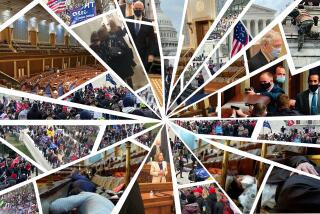LEGISLATION : Where There’s Smoke: Great Tobacco War Rages in Capital
- Share via
WASHINGTON — Two centuries ago, when the U.S. Capitol was under construction, tobacco was king. It was so highly prized that architects used tobacco leaf designs in the Capitol’s walls and ceilings, where they remain as a reminder of the importance of this valuable export crop to the economy of the infant United States.
Now, the tobacco industry is not only not celebrated, it is under attack on Capitol Hill. An epic struggle is under way between the industry’s defenders and a determined band of lawmakers who want to place unprecedented restrictions on smokers and extensively regulate the making and marketing of cigarettes.
President Clinton, who has declared the White House a smoke-free zone, has taken a leading role. The Pentagon has declared a no-smoking policy for the armed forces, and the Labor Department has proposed a wide-ranging ban on smoking in workplaces. Clinton has asked for a 75-cent-a-pack increase in the cigarette tax to help pay for health care.
The main battleground now is the House Energy and Commerce subcommittee on environment and health. Chairman Henry A. Waxman (D-Los Angeles), a former smoker, is the latest point man against the tobacco industry.
It was Waxman who summoned seven chief executive officers of tobacco firms to a hearing recently and demanded to know why they were increasing the nicotine content of cigarettes. Their answer--that it was done to improve flavor--was widely derided.
But, despite scientific findings about the deadly effects of smoking, no one in Congress has suggested an outright ban on cigarettes, now being used by 50 million Americans. Even reducing or eliminating nicotine--the ingredient scientists believe makes cigarettes addictive--lacks widespread support.
So Waxman and his allies are searching for ways to promote health by discouraging people from beginning the habit, finding a way to stop people from smoking and shielding nonsmokers from the effects of cigarettes.
But the tobacco industry, once considered invincible, is still a formidable foe.
“The tobacco lobby has not only the members from tobacco states but has befriended other members of Congress in key positions,” said Rep. Richard J. Durbin (D-Ill.). “It’s still very powerful.”
Senate Majority Whip Wendell H. Ford (D-Ky.), for one, is a staunch advocate for tobacco interests.
Tobacco companies have contributed heavily to campaigns. Even so, tobacco is no longer politically untouchable.
“No question, the tobacco industry is embattled,” said Rep. Thomas J. Bliley Jr. of Virginia, who represents a tobacco-growing district and is the ranking Republican member of Waxman’s subcommittee. “It’s politically incorrect.”
Bliley thinks a report by the Environmental Protection Agency in 1993, which declared that secondhand smoke could cause cancer in nonsmokers, gave anti-tobacco forces momentum.
But the anti-smoking drive in Congress began long before that. The first major restriction was imposed in 1987, when Congress voted to ban smoking on airline flights of less than two hours. In 1989, Congress banned smoking on all domestic flights.
And this year, an amendment to the Goals 2000 education bill barred smoking in all schools that get federal funds, day care centers, Head Start classrooms and centers for Women, Infants and Children nutrition programs.
Attention now is riveted on Waxman’s subcommittee, where he is pressing for action on a bill to ban smoking in virtually all public places. So far, he lacks the 13 votes needed to get it approved.
Waxman twice has scheduled meetings to take up the bill but has had to cancel them when he came up short of votes. A major obstacle is the nine Republicans on the committee, who have been lining up with Bliley against the bill. While there are 15 Democrats on the panel, not all are willing to support Waxman’s legislation.
“I don’t think the bill as currently written will become law--it’s too sweeping,” Bliley said.
Says Rep. Scott L. Klug (R-Wis.): “If they figure out a way to build in some exceptions, I’d be glad to support it. It’s a little far-reaching to say that every bowling alley and tavern in Wisconsin be smoke-free.”
More to Read
Sign up for Essential California
The most important California stories and recommendations in your inbox every morning.
You may occasionally receive promotional content from the Los Angeles Times.












